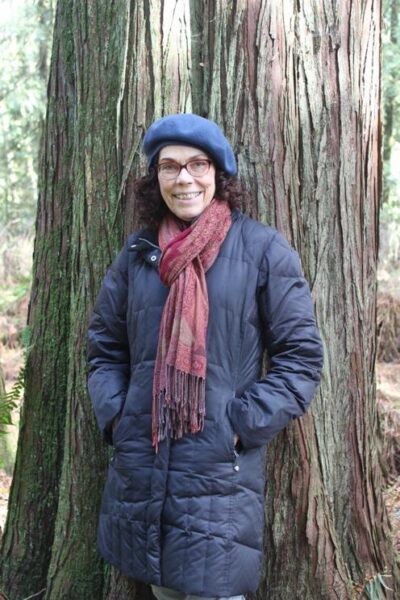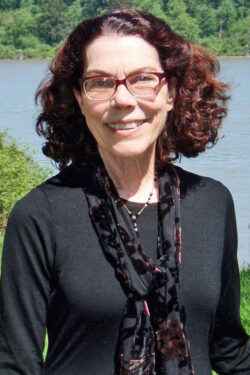1161 If poetry could save the planet
Heart Work
by Susan McCaslin
Victoria: Ekstasis Editions, 2021
$24.95 / 9781771714020
Reviewed by Jessica Walters
*
 While standing in an eco-forest located just outside of Fort Langley, I read one of McCaslin’s poems. Even on a hot day, the Blaauw Eco Forest was cool under a layered canopy of hemlock, western red cedars and Douglas fir trees. Carefree, I walked down a path in the forest without knowing that she and several others had fought to save it from destruction, and that the trees stood not by accident but with intent. The forest was saved by a group of activists and a local philanthropist who would buy it and donate it to a nearby university as a research station. I found her poem “Dear Lovers’ Tree” on a plaque in the forest and read the first lines, “I fell in love with a forest / and became an activist.” As I stood in the forest, I wondered if poetry could save the planet.
While standing in an eco-forest located just outside of Fort Langley, I read one of McCaslin’s poems. Even on a hot day, the Blaauw Eco Forest was cool under a layered canopy of hemlock, western red cedars and Douglas fir trees. Carefree, I walked down a path in the forest without knowing that she and several others had fought to save it from destruction, and that the trees stood not by accident but with intent. The forest was saved by a group of activists and a local philanthropist who would buy it and donate it to a nearby university as a research station. I found her poem “Dear Lovers’ Tree” on a plaque in the forest and read the first lines, “I fell in love with a forest / and became an activist.” As I stood in the forest, I wondered if poetry could save the planet.
I imagine that what it takes to save a forest is not dissimilar from what it takes to write a book of poetry like Heart Work — ecological passion, a fiery vision, and deftness with language. Heart Work does what a walk in a forest does: it awakens the reader to natural world, pulsating with life while drawing attention to the fragility and imminent destruction of the planet.
Heart Work contains four poetry suites, each differing in content and style but like Handel’s Water Music with several movements varying in character but written in complementary musical structures, Heart Work coheres around McCaslin’s eco-consciousness.
In the first suite, the poet poses a question, “Do tree have hearts? / The ancients thought so.” She responds with:
New science says trees
patient sustainers have hearts.
A fond thought, but McCaslin ruptures it, as the narrator continues:
Yet still we rip and tear hack and hew
prophet-less in our profit-based economies
Collective greed has created a new crisis:
eco-nausea eco-tensions

While I was reading Heart Work, activists were being arrested for protesting logging in old growth forests in BC, and I found the above lines particularly poignant, wondering as I read them, if activists are the modern iteration of prophets, protesting “collective greed.”
Many of the poems in the first suite are ekphrastic — poems that describe works of art. In “Hildegard Meets St. Francis and the Wolf,” McCaslin draws on Betty Spackman’s Panel 9 of “A Creature Chronicle” found on the cover of Heart Work. The work of art, like the poems it inspired weaves ancient and current wisdom, “Old and new past and present converge” (p. 12). Within these intricate poems, McCaslin renders an expansive tapestry of time, situating the reader not only in the present but also in ancient mythologies and mysticism making her critique of our current crises all the more convincing.
In the second suite, “Negative Capability,” McCaslin riffs on lines from John Keats’s letters. Her poems play with Keats’s desire to be “capable of being in uncertainties, mysteries, doubts, without any irritable reaching after fact and reason.”[1] In this suite, McCaslin embodies Keats’s vision, using different ways of knowing to sculpt her poems. At a time when we experience such a glut of information, when data and stats are often tweeted, quoted and retweeted, it is refreshing to seek refuge in the forest, the mysterious, and imaginative:
I told my love I’d rather
we were herons, haunting
the creek below the dike
knowing for just a day
their silent ways, the shimmer
of flashing, prehistoric wings.

In this compelling section, it’s as if McCaslin goes deep-sea diving, exploring unknown waters fathoms deep, resurfacing with treasures in hand.
In “Cariboo Fires, 2017,” each poem is paired with a photo taken by McCaslin’s husband, Mark Haddock. The poems arose out of catastrophic fires in Cariboo Region of BC’s interior. The poems are brief, almost haiku-like in their stark imagistic renderings. Haddock’s photos of the fire’s aftermath are jarring, like scenes from now ubiquitous post-apocalyptic movies. But these photos are no fiction: they are evidence of a landscape in crisis.
McCaslin introduces “Cariboo Fires, 2017” by declaring that, “in July 2017 one of the many raging summer fires in the Cariboo Region of BC swept north from Ashcroft, eventually forcing many residents to evacuate the area.” She goes on to describe the near loss of her husband’s family cabin and her belief that the fire was “due to the effect of human carelessness, inappropriate land management, and climate change.”
“Cariboo Fires, 2017” could become a diatribe of personal losses. But McCaslin avoids that sentiment. She writes about her connection to the land, moving from the personal to the communal and then to the global. A different poet might have catalogued the personal heartache associated with the fire, but McCaslin makes a wider statement. It’s as though she is offering readers a glimpse of what their own future might hold if the climate crisis continues.
This movement from the personal and particular to the universal is seen throughout Heart Work and is reminiscent of the best nature poets. (I’m thinking here of Mary Oliver’s “The Summer Day”). McCaslin uses a similar strategy evoking the universal through the lens of the personal, while situating herself within the current moment. She begins with paying close attention to what is in front of her, whether that is a snail, a pileated woodpecker, or a black squirrel. She pans her camera to a vaster landscape.
Such a skilful strategy is evident in her final suite “Corona Corona.” An example is in her poem, “It was the best of times, it was the worst of times:”
Here a woman in her woman cave
Is writing poems wall are palimpsests
Morning a barred owl perches outside her window
rotates its head almost 360 degrees –
…
outside her virtual membranes
refugees are mingling on the roads starving
no social distancing
In this poem the poet moves from herself as poet in a “woman cave” to the world outside. In the poem “Small is Large,” McCaslin draws on the visions of mystic Julian of Norwich, an apt allusion as Julian saw the world in a single hazelnut; so too, McCaslin sees her universe in the seed of a poem.
I want to return here to the first poem I found in a forest, “Dear Lover’s Tree.” In that poem, the love of a forest sparked the poet’s activism, resulting in the Han Shan Poetry Project.” Heart Work offers a kind of a sequel. As I read these poems, differing in style but similar in theme, it seemed that whether the poet wrote about natural disaster, 11th century mystics, climate crisis or the pandemic, love was the propelling energy that prompted the larger questions and critiques.
While I have drawn out a single theme in Heart Work, I realize the richness of this work has only been touched upon. Mysticism, saints, and current events are interwoven, creating a powerful and striking whole.
Editor’s note: see here for an interview with Susan McCaslin on writers radio.ca
*

Jessica Walters teaches creative writing at Trinity Western University. Her stories have been published in [s p a c e s] literary journal, and in Convivium. Her short story “Glass Jars” was shortlisted for the Mitchell Prize for Faith and Writing. She is currently working on a collection of short stories about Jesus impersonators and the real Jesus attempting to use social media for the first time to announce his second coming.
*
The Ormsby Review. More Books. More Reviews. More Often.
Publisher and Editor: Richard Mackie
The Ormsby Review is a journal service for in-depth coverage of B.C. books and authors. The Advisory Board consists of Jean Barman, Wade Davis, Robin Fisher, Cole Harris, Hugh Johnston, Patricia Roy, Maria Tippett, and Graeme Wynn. Scholarly Patron: SFU Graduate Liberal Studies. Honorary Patron: Yosef Wosk. Provincial Government Patron since September 2018: Creative BC
“Only connect.” – E.M. Forster
Endnotes:
[1] “Negative Capability,” Poetry Foundation. https://www.poetryfoundation.org/learn/glossary-terms/negative-capability. Accessed 01 June 2021.
5 comments on “1161 If poetry could save the planet”
I believe poetry can split us open so we can get back to saving the planet.
Yes, let’s hope that poetry really can save the planet! It seems a lot more likely than thinking our current breed of politicians might do so.
Thanks, Heidi. Agreed about the current politicians.
Thank you Susan for your poetry and for your work to save the forest. Thank you Heidi for your astute observations. May we all stay connected